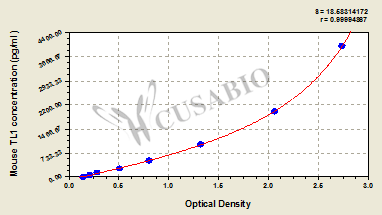The product CSB-E16311m is a sandwich ELISA kit developed to measure levels of mouse tumor necrosis factor-like ligand 1 (TL1) in serum, plasma, or tissue homogenates. The enzyme-substrate chromogenic reaction is also used to amplify the signal and quantify the levels of the analyte through the intensity of the colored product. The color intensity positively correlates with the amount of TL1 bound in the initial step.
TL1, encoded by the gene TNFSF15, is a transmembrane protein produced by a variety of cell lines, including endothelial cells, macrophages, dendritic cells (DCs), and T cells. It plays a key role in the regulation and connection between innate immunity and adaptive immunity of mucosal inflammation and thus is implicated in inflammatory bowel disease. It is expressed by immune and endothelial cells in response to numerous pro-inflammatory stimuli. Through its receptor DR3/TNFRSF25, which is expressed primarily on lymphocytes, TL1 stimulates T cell activation, proliferation, and generation of a broad array of cytokines.




